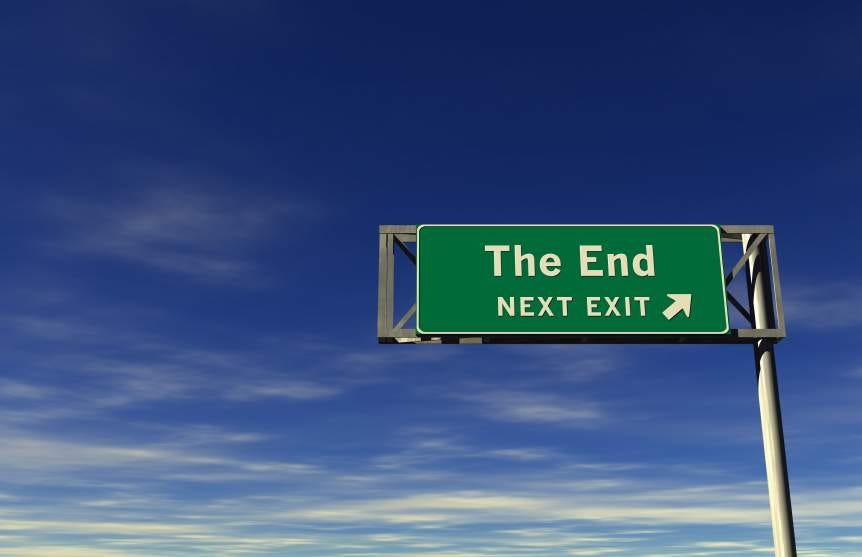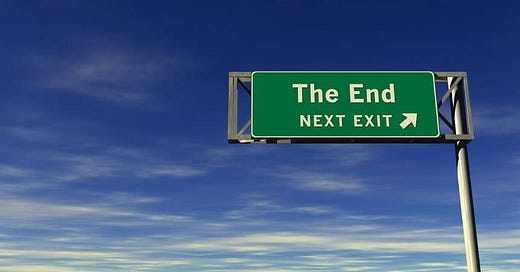Ends Are More Than Endings

"Begin with the end in mind," is a powerful and simple concept. It's also frequently misunderstood.
The phrase has been in our cultural lexicon for a few millennia, but Dr. Stephen Covey was (perhaps) the first great popularizer of the concept. It's one of the key habits in the 7 Habits of Highly Effective People, and, in his framework, the cash value of the principle is that it keeps you future-focused and allows you to script your actions to match the future you're trying to create.
Dr. Covey uses the phrase in two distinct ways. Here's the first use:
The most fundamental application of "begin with the end in mind" is to begin today with the image, picture, or paradigm of the end of your life as your frame of reference or the criterion by which everything else is examined.
Here's the second, simpler use: "To begin with the end in mind means to start with a clear understanding of your destination."
In both cases - and especially in the second case - it's clear that he's using end as a terminal end. I'll refer to this use as "ends as endings."
With no disrespect to Dr. Covey, this way of understanding "begin with the end in mind" is over-simplistic. Ends are about more than endings - the more accurate way to understand ends is that they're about the principles behind why you do things.
To see this, consider another common use of the word end. We often ask "do ends justify the means?", and in this case, it's quite clear what's meant: does the reason behind doing what we're doing justify what we're doing? This phrase is normally invoked when it seems that we're doing some unethical action to advance some ethical principle or effect, but it can be asked in contexts outside of ethics just the same. For instance, I've often asked you to think about whether the juice is worth the squeeze when you're trying to save time - it's the same basic idea that I've wrapped in metaphor.
What's Wrong With "Ends As Endings"?
While I think semantics are important, there are three important reasons why it's better to understand end in its more complete sense:
"Ends as endings" fails when we can't see the end.
This is especially important for us creatives, because we have the unique and sometimes frustrating capability to change the course of our lives, and, on a larger scale, history. I honestly don't know what the end of 2013 will look like - I can set intentions, goals, and visions, but the reality is that there's no end to begin with. I'm busy creating it right now.
If we loosen it up a bit, we can ask the question of "what would we like to see happen as a result of this action?," which may be closer to what Dr. Covey meant. Then we can work backwards so that we have a future-driven plan and that's quite useful. In some ways, though, understanding "ends as endings" thwarts the very exercise that "begin with the end in mind" is attempting to prompt; at a certain point, we understand that endings are beginnings, so we don't know where to put a stake in the ground.
"Ends as endings" doesn't account for the many reasons we do things.
This is a more critical problem with understanding "ends as endings." We have many reasons for doing most of the things that matter to us, and focusing on the end (singular) prevents us from seeing possibilities for synergy.
An example would be helpful here. Most days, Angela and I eat lunch together, and there are several ends for us doing this: 1) we're hungry, 2) we want to spend time with each other, 3) we need to take a break from working, and 4) we need to have a mid-day huddle.
We can understand "end" here in Dr. Covey's sense by imagining what we wanted to have accomplished by the end of the meal, as if it were a picture. In that picture, Angela and I would have a shared vision for the rest of the day and be sated physically, socially, and mentally.
That sounds like a completely organic way of understanding eating lunch with your spouse, no?
As foreign as that description might sound, it's a powerful way of setting the intention for what we want to happen at our lunches. It's relatively easy for me to do it now because of the way that I'm wired, but it's not something that a lot of people can do.
Notice that I used the multiple ends to generate the ending, rather than using the ending to generate the ends. In my experience, that's where people fall down with the end as ending model - since they can't imagine the ending (#1 above) they can't imagine the ends.
"Ends as endings" focuses on outcomes rather than processes.
Starting with "ends as endings" focuses on some outcome of our actions rather than the processes that generate outcomes. When you look at peak performers, what you notice is that they tend to be process-driven rather than outcome-driven, and there's no coincidence here. You have much more control over what you do than what happens, and if you continue to do processes that lead to success over time, you'll have a tendency to be more successful.
That, by the way, is why strategists almost always win the long game if they can make it through the short game. Their habits, principles, and foundation set the stage for them to build momentum, whereas those without strategy are more subject to the whims of fate, luck, and timing. (Don't worry, I'll be writing more on this.) As a habit (process), "begin with the end in mind" works beautifully. As an understanding, not so much. This distinction is subtle but important.
A New Beginning For Ends
To understand "begin with the end in mind" in its most powerful form, we need to drop "ends as endings" and understand "ends as principles or reasons." When we do, we can create the beautifully-layered visions and plans that are synergistic, effective, and much more representative of the complexity of our lives.
Since I use "ends" all the time in my natural language and writing, you now know what I mean. When I use begin with the end in mind, I always mean "start with purposes and principles before considering means," or, less abstractly, "start with the reasons why you're wanting to do something before moving to the hows, whats, and whens of the matter."
I hope this helps you get a fresh start with ends.




